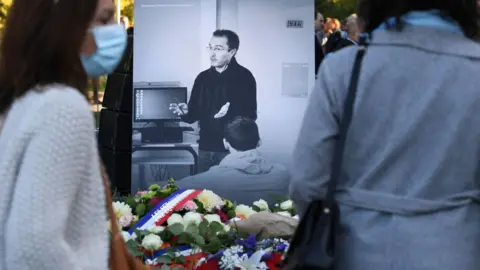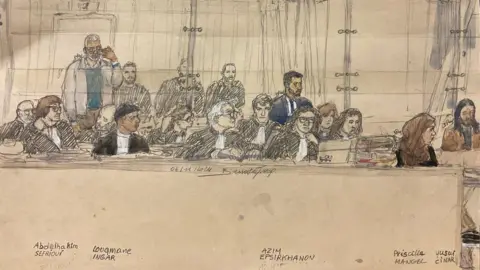 AFP
AFPEight people accused of complicity in the jihadist assassination of French teacher Samuel Paty must know their fate following a six-week trial before a Paris court.
Among them, the father of a schoolgirl whose lie about Paty's alleged discrimination against Muslims in class chained the events that led to his beheading in a street in October 2020.
Also on trial are a Muslim activist who led an online campaign against Paty, two childhood friends of the Chechen-born killer Abdoullakh Anzorov who allegedly helped him acquire weapons, and four radicalized men with whom he exchanged messages on social networks.
Anzorov was shot dead by police minutes after killing the 47-year-old history and geography teacher outside his high school in Conflans-Saint-Honorine, a Paris suburb.
He was excited by claims circulating on the Internet that, days earlier, Paty had ordered Muslims to leave his class of 13-year-olds before revealing obscene photos of the Prophet Muhammad.
In fact, Paty was teaching a class on free speech and, before showing one of the controversial images first published by Charlie Hebdo magazine, he advised students to avert their eyes if they feared be offended.
The schoolgirl, named Z. Chnina, wasn't even in class when it happened, but she told her father that she was punished for raising an objection.
The trial focused on legal arguments over whether people who had no knowledge of the attack – or in some cases its perpetrator – could nevertheless, through their comments, be guilty of “association terrorist.”
In court this week, prosecution lawyers requested prison sentences ranging from 18 months suspended to 16 years for the defendants, saying their actions indirectly led to the atrocities.
However, the prosecution also angered members of Paty's family by refusing to demand maximum sentences and downgrading the characterization of some of the crimes charged.
 Getty Images
Getty ImagesDuring the trial, the court heard the first public testimony of the girl, Z. Chnina, now 17 years old.
A year ago, she was given a short suspended sentence for defamation by a juvenile court, whose hearings took place behind closed doors.
“I would like to apologize to everyone [Paty family] because without my lies, they wouldn’t be here today,” she said, sobbing.
“And I want to apologize to my father because when he made the video, it was partly because of my lying.”
In the days following Paty's freedom of expression course, his father Brahim Chnina made videos denouncing the teacher by name. He also called on activist Abdelhakim Sefrioui to spread the campaign on his social networks.
Chnina and Sefrioui never called for action against Paty and they were unaware of Anzorov's existence until the murder took place.
But for the prosecution, they were nevertheless guilty of “terrorist association”, because they knew the possible consequences of their campaign.
“No one said they wanted Samuel Paty dead, but by lighting 1,000 digital fuses, they knew that one of them would lead to jihadist violence against the teacher,” according to the prosecution.
The context of October 2020 was that of increased tensions linked to jihadist violence, after Charlie Hebdo republished some of the controversial caricatures of Mohammed. Five years earlier, most of the magazine's staff had been murdered during an armed jihadist attack in their Paris offices.
In court this week, the longest prison sentences were sought against Anzorov's two friends who accompanied him when he bought a knife and a fake weapon. One of them also drove Anzorov to school on the afternoon of the attack.
None of these defendants are radicalized Muslims and it was not established in court that they were aware of Anzorov's plans.
This is why the prosecution reclassified the charges against them as “complicity in a terrorist attack”, punishable by life imprisonment.
The other four accused are people with whom Anzorov conversed on social networks, again without him ever revealing his intention to kill Paty.
One of them, Priscilla Mangel, a convert to Islam, admitted to making “provocative” remarks online about the Paty affair, but said she would never have made them if she had known about the Anzorov's intentions.
“For me, it was a harmless discussion with an anonymous person.”
For defense lawyers, none of the accused would have been subject to criminal prosecution for their comments, without Paty's murder.
The main legal question facing the court is therefore whether the remarks can become illegal based on what follows.
#Defendants #face #verdict #actions #led #beheading
